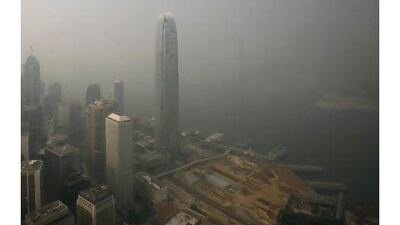BEIJING // The smog that can shroud the skyscrapers of Hong Kong may be doing more than just blocking out the sun. A survey just released indicates that as many as a quarter of the territory's residents would consider leaving because of the poor air quality.
Fears have long been voiced that the city, China's leading financial centre, could suffer a brain drain as professionals move to cleaner cities such as Singapore, or decide not to come to Hong Kong in the first place.
The survey findings "paint a bleak picture of Hong Kong, in which more and more people have given up complaining and started packing their bags", according to a report from the think tank Civic Exchange, which carried out the poll.
Hong Kong's pollution partly comes from factories in southern mainland China, the country's primary manufacturing belt.
However, campaigners have said there is much that can be done in Hong Kong itself, since coal-fired power stations and vehicles are also blamed for much of the pollution.
There are calls for the authorities to dispense with voluntary initiatives to clean the air, and instead show "a clear sign of determination to improve", said Christian Masset, the chairman of the group Clear the Air, speaking before the survey was released.
All new vehicles in Hong Kong should be hybrids, he said, the habit of leaving engines idling should be banned and diesel vehicles phased out. "The number of bad-air days in Hong Kong is still high," Mr Masset said.
On the mainland, the problem is no less acute. This year, air quality nationwide declined for the first time in five years, and in Beijing it has also deteriorated as the city's car population continues to grow, reversing previous improvements.
Up to and during the Olympics, heavily polluting plants were shut and reopened far from the city, cars with odd or even number registration plates banned on alternate days, work at construction sites put on hold and many old coal-burning heaters in traditional houses replaced with cleaner equipment.
The number of days when air quality reached the government's Grade II standard, known as a "blue sky day", increased to 285 in 2009, up from 247 two years earlier. In 1998, there were just 100 blue-sky days.
Now though, the desire for cleaner air is coming up against China's rapid economic growth and the huge expansion in car ownership tied to it.
About 2,000 extra cars arrive on Beijing's roads each day, and the total number of vehicles, estimated at 4.5 million in September, is expected by the Beijing Transport Research Centre to have increased to 7 million by 2015. At the same time, restrictions on when vehicles with certain number plates can be used have been relaxed.
In the first six months of this year, the number of blue sky days in Beijing dropped to 140, from 146 in the same period in 2009. Nationwide, the first reduction in blue sky days for five years was seen, according to the official Xinhua news agency.
The air may not be safe even on a blue sky day, which is one in which the average concentration of particulate matter 10 microns in diameter is less than 100 microgrammes per cubic metre. This is still five times the World Health Organisation (WHO) ideal target figure below which there are no detectable bad health effects.
As well as causing respiratory illnesses, particulate matter, especially that around 2.5 microns in diameter, can enter the bloodstream through the lungs and increase the risk of cardiovascular disease. A WHO report in 2007 estimated 656,000 Chinese died annually from indoor and outdoor pollution.
Earlier this year, Beijing's mayor, Guo Jinlong, conceded the city still had "an extremely serious" pollution problem.
Tom Wang, a spokesman for Greenpeace China, says a lot more needs to be done, in particular the adoption of more ambitious air quality targets that equal WHO recommendations.
"The first thing Beijing needs to do is to have standards. The air is not as great as they say in the figures," he said.
"If you compared today with 10 years ago, there's an improvement, but it's not good enough."
The country's dependence on coal, which Mr Wang described as China's largest environmental problem, should be lessened, he said.
In provincial cities, which lack the international attention of Beijing, there is even less pressure to improve air quality. Indeed, concerns have been expressed that, with more heavy industry moving to inland provinces, in many places air quality will worsen.
"The challenge to improve environmental policies in other cities is much, much bigger," Mr Wang said.


